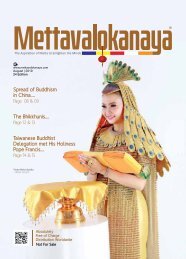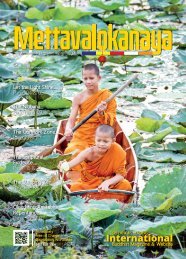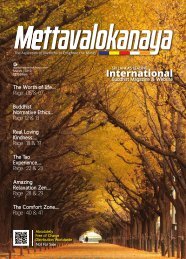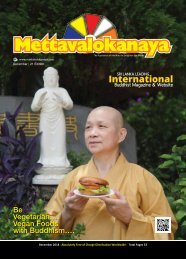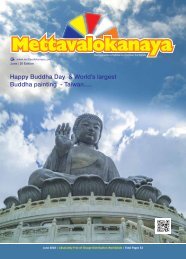mettavalokanaya_buddhist_magazine_january_2021.
This is the Sri Lankan's Most Popular & Leading Monthly International Buddhist Magazine, “Mettavalokanaya” on January - 2021 Edition - 30. “Mettavalokanaya” International Buddhist Magazine has been successfully distributed to 40 countries worldwide. Specially distributed to Overseas High Buddhist Monks, Masters, Nuns, Worldwide famous Buddhist Monasteries & Associations, International Buddhist conferences and Forums. “Mettavalokanaya” International Monthly Buddhist Magazine has been awarded as the “2018 - The Global Buddhist Ambassador Award” from Thailand as the World’s Best and Most popular Buddhist Magazine. The Mettavalokana Buddhist Publications Centre is a registered Buddhist Publications Centre in Sri Lanka and has received many International accolades. Our publications are absolutely free of charge to general public. The magazine comprises of special articles on Buddhism written by leading Buddhist Monks from foreign countries. “Mettavalokanaya” is currently been published in English and includes full color 60 pages.
This is the Sri Lankan's Most Popular & Leading Monthly International Buddhist Magazine, “Mettavalokanaya” on January - 2021 Edition - 30. “Mettavalokanaya” International Buddhist Magazine has been successfully distributed to 40 countries worldwide. Specially distributed to Overseas High Buddhist Monks, Masters, Nuns, Worldwide famous Buddhist Monasteries & Associations, International Buddhist conferences and Forums. “Mettavalokanaya” International Monthly Buddhist Magazine has been awarded as the “2018 - The Global Buddhist Ambassador Award” from Thailand as the World’s Best and Most popular Buddhist Magazine. The Mettavalokana Buddhist Publications Centre is a registered Buddhist Publications Centre in Sri Lanka and has received many International accolades. Our publications are absolutely free of charge to general public. The magazine comprises of special articles on Buddhism written by leading Buddhist Monks from foreign countries. “Mettavalokanaya” is currently been published in English and includes full color 60 pages.
You also want an ePaper? Increase the reach of your titles
YUMPU automatically turns print PDFs into web optimized ePapers that Google loves.
Purity of
Mind….
There was once a senior monk
named Sangharakkhita. When
his sister gave birth to a son, she
named him after her brother.
He soon grew up, entered the Sangha
and was given the name Sangharakkhita
Bhaginayya. The young monk was
offered two sets of robes and he wished
to share one with his uncle who refused,
saying that he had enough robes. The
young monk felt disheartened by his
uncle’s refusal and thought that it would
be better if he disrobed and became a
layman.
After this decision, the young
monk thought that when he became
a layman he would sell the two sets of
robes and buy a female goat. That goat
would breed quickly and he would soon
have enough money to marry. Then
he and his wife would have a son. He
imagined that he would take the child
to see his uncle in the monastery. On
the way he wanted to hold the child in
his arms but his wife told him to just
drive the cart and not to worry about
the child. This started an argument
between them. During the argument
he accidentally dropped the child on
the ground and the cart drove over the
young boy killing him. The man was so
furious that he readied himself to beat
his wife with a goat whip, but did not
strike her.
At that moment, lost in thought
while fanning his uncle with a palm
branch, he accidentally struck the
elder on the head. The senior monk
knowing the thoughts of his nephew
said to him, “You were unable to beat
your wife. Why have you beaten an
old monk?” The young Sangharakkhita,
shocked and embarrassed, fled from
the monastery. Young monks caught
him and took him to see the Buddha.
The Buddha was told what happened
and said to young Sangharakkhita that
the mind has a tendency to stray from
its original thought toward far distant
destinations. He also said that one
should strive diligently for liberation
from the bondage of sensual lust, ill
will and ignorance. Then the Buddha
uttered a verse, “The mind is capable of
traveling vast distances – up or down,
north or south, east or west – in any
direction. It can travel to the past or the
future. It roams about all alone.”
What we call “mind” is a flow
or stream of thoughts which rise and
vanish repeatedly, leaving no gap. Risi
and vanishing together with mind-units
of this process consists of a number
of mental characteristics which rise
and vanish together. Every mind-unit
arises depending on an object; there
is no mind-unit that arises without
dependence on some object: visible
objects, sounds, odors, flavors, tangibles
and ideas. There are the six kinds of
objects depending on which mind-units
arise in the mind-stream.
If we examine how our thought
arises and vanishes, we find our mind
is wandering and straying. This mind
is scattered, not unified or fixed on
one object. The Buddha said in the
Dhammapada, “As a fish when pulled out
of the water and cast on land throbs and
quivers, even so is this mind agitated.”
During the Buddha’s first visit to
Kapilavattu Prince Nanda was admitted
to the order of monks. Although Nanda
had taken up Bhikkhuhood he could
still hear his fiancée Janapadakalyani
saying to him “O my dear come back
to me soon.” This is what he imagined.
Nanda tried to run away from the
monastery. The Buddha, knowing the
distress of Bhikkhu Nanda, used his
supernormal power to take Venerable
Nanda to Tavatimsa heaven. After he
got back to Jetavana monastery, the
Buddha explained to him, “When the
house is protected with a well-thatched
roof, it is not at all harmed by the rain.
The rainwater cannot seep through.
In the same way, a well cultivated
temperament does not allow passion
to come through.” The rain is thoughts
and the roof is the mind.According
to the Buddha there are four kinds of
food. The physical organism craves
food (kabalinkahara); it needs food
to survive. The second kind of food
(phassahara); craving for contact. The
Buddha referred to this contact with
regards to the five senses. The third
kind of food (manosancetasikahara) is
the mind craving for thoughts. It needs
thoughts to keep it busy, to keep control
and to create things. The fourth kind of
food (vinnaahara); this is consciousness
craving for the false “I” concept.
If we are not mindful, craving
for thoughts can feed our mind
toxic narratives. We can get
negative thoughts which are
unwholesome. Even some
thoughts may become a
major source of anxiety and
stress. That is why the Buddha
asked us to feed ourselves with
right thoughts which are wholesome.
“Every thought-seed sown or allowed
to fall into the mind to take root there
produces its own blossoming action
sooner or later to bear its own harvest
of opportunity and circumstance. Good
thoughts bear good fruit; bad thoughts,
bad fruit.” [“As a Man Thinketh” p. 12].
The Buddha said, “Mind precedes all
mental states. Mind is their chief; they
are all mind-wrought. If with an impure
mind a person speaks or acts, suffering
follows…If with a pure mind a person
speaks or acts, happiness follows…”
[Dhammapada v.1 & 2].
Mind is
Scattered
USA
Most Venerable
Aggamaha Pandita Dr.
Walpola Piyananda Thero
28 l Mettavalokanaya l January l 2021 2021 l January l Mettavalokanaya l 29











